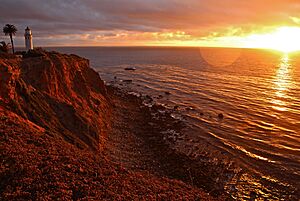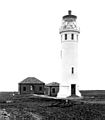Point Vicente Lighthouse facts for kids
| Location | Point Vicente Rancho Palos Verdes California United States |
|---|---|
| Coordinates | 33°44′31″N 118°24′39″W / 33.741867°N 118.410738°W |
| Year first constructed | 1926 |
| Automated | 1973 |
| Foundation | concrete base |
| Construction | reinforced concrete tower |
| Tower shape | cylindrical tower with balcony and lantern |
| Markings / pattern | white tower, black lantern |
| Height | 67 feet (20 m) |
| Focal height | 155 feet (47 m) |
| Original lens | Third order Fresnel lens by Barbier, Bernard and Turenne |
| Range | 24 nautical miles (44 km; 28 mi) |
| Characteristic | Fl (2) W 20s. |
The Point Vicente Lighthouse is a famous lighthouse located in Rancho Palos Verdes, California. It stands tall on a cliff north of the Los Angeles Harbor. This important landmark was built in 1926. The lighthouse itself is about 67 feet (20 meters) tall. It sits on a cliff that is 130 feet (40 meters) high. This makes its light visible from far away.
The Point Vicente Lighthouse is found between the Point Loma Lighthouse to the south and the Point Conception Lighthouse to the north. In 1980, it was added to the National Register of Historic Places. This means it's a special historical site. The United States federal government owns the lighthouse. The United States Coast Guard takes care of it. Currently, the lighthouse is not open for public visits.
Contents
History of the Lighthouse
The Point Vicente Lighthouse was built in 1926. People had complained for years about how dangerous the waters were around the Palos Verdes peninsula. The lighthouse was placed just north of the entrances to the Los Angeles and Long Beach Harbors. Its white, round tower is 67 feet (20 meters) tall. The stone structure stands right on the edge of a 130-foot (40-meter) cliff. This means the center of its light is 185 feet (56 meters) above the ocean.
The Special Lens
The lighthouse used a special lens called a classical third-order rotating Parisian Fresnel lens. This lens was about 5 feet (1.5 meters) wide. It had been used in Alaska since 1886. The company that made it, Barbier, Benard, et Turenne, was the oldest lens-making company in the world. The lens was made of hand-ground glass pieces. These pieces were held in place by a brass frame. When it was working, its very bright beam could be seen up to 24 nautical miles away on a clear day.
Changes Over Time
In 1934, the Long Beach Radio Station opened in a building next to the lighthouse. This station helped monitor for distress signals from ships. The United States Lighthouse Service used to operate the lighthouse. In 1939, this service joined with the U.S. Coast Guard. The Coast Guard then took over all responsibilities for navigation aids.
During World War II, the lighthouse's light was dimmed. It was set to only 25 watts to avoid helping enemy ships. The lighthouse had people working there until 1971. Then, it became automated. This meant a remote electronic system controlled it. The radio station closed in 1980. In 2015, the Coast Guard decided to replace the old lens. They planned to use a new LED light that could be seen 14 nautical miles away. The original lens was removed from the light room in February 2019.
The Coast Guard Light List says the lighthouse's light flashes white twice. This pair of flashes repeats every 20 seconds. If the main light goes out, a less bright emergency light turns on. The old lens is now on display at the Point Vicente Interpretive Center. This lighthouse also used to have a foghorn. It warned ships when it was foggy. The foghorn was taken apart in the early 2000s.
Lighthouse Keepers
These are some of the people who were in charge of the lighthouse:
- George W. L'Hommedieu (1925–1930)
- Anton Trittinger (1930–1945)
- Joseph May (1945–1955)
The Lighthouse Today
The Point Vicente Lighthouse and its surrounding land are federal property. The United States Coast Guard owns and operates them. As mentioned, the lighthouse is currently closed to the public.
The US Coast Guard's Aids to Navigation Team Los Angeles/Long Beach (CG ANT LA/LB) is responsible for running and maintaining the lighthouse. Members of the US Coast Guard Auxiliary help with tours and open houses. They are also assisted by the United States Naval Sea Cadet Corps. Besides the lighthouse, the property has a museum. There are also three houses that used to be homes for Coast Guard staff.
Gallery
See also
- List of lighthouses in the United States
 | Percy Lavon Julian |
 | Katherine Johnson |
 | George Washington Carver |
 | Annie Easley |






